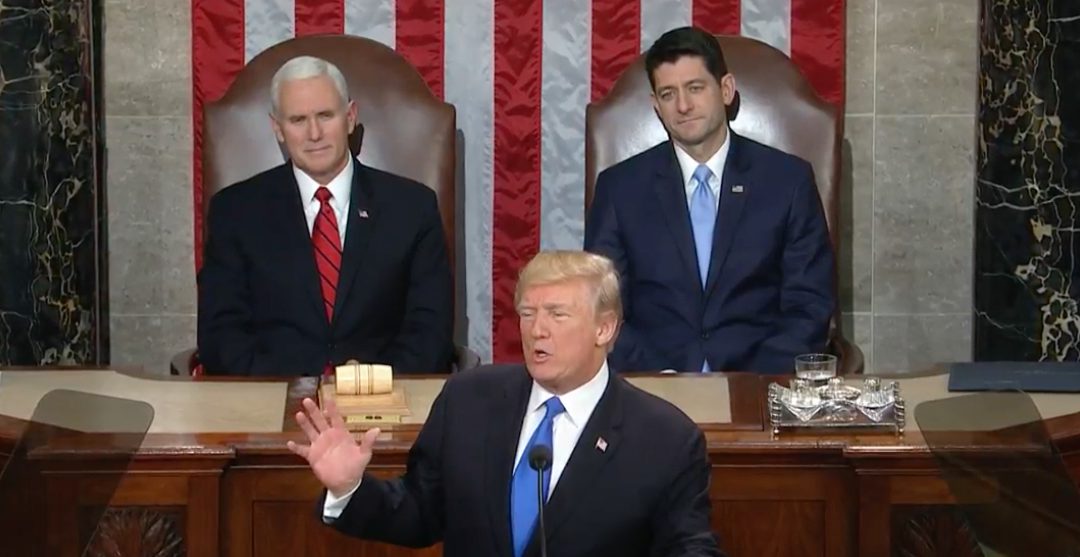WASHINGTON — President Donald Trump kicked off his first official State of the Union address Tuesday by touting the success of his tax bill and taking credit for record stock market highs.
“Just as I promised the American people from this podium 11 months ago, we enacted the biggest tax cuts and reform in American history,” he said.
“Small business confidence is at an all-time high, and the stock market has smashed one record after another, gaining $8 trillion in value.”
Amidst a tense atmosphere in the House chamber, where Trump addressed a joint session of Congress and guests, he received a standing ovation from Republicans when he heaped praise on America’s economic success under his tenure, while Democrats remained seated with stoic expressions.
“Our massive tax cuts provide tremendous relief for the middle class and small businesses, and since we passed them roughly 3 million workers have already gotten tax cut bonuses – many of them thousands of dollars per worker,” he said.
Economic boom has been perhaps the most positive news to come out of Trump’s first year in office. Since signing the $1.5 trillion tax overhaul bill in December ‒ which delivered permanent tax cuts for corporations by dropping the corporate rate from 35 percent to 21 percent ‒ national economic growth has continued to increase at a steady pace, with the government reporting a GDP annual growth rate of 2.6 percent in the final quarter of 2017.
While the president has been citing ‒ and even exaggerating ‒ the amount workers across the country are receiving in bonuses as a direct result of his corporate tax cuts, economists warn that overall the bill is still skewed to primarily benefit the very wealthy.
A recent Reuters/Ipsos poll found that merely 2 percent of workers have reported receiving a bonus or raise as a direct result of the tax cuts, as further evidence of the fleeting, short-term effects the bill has on low and middle-income workers.
“I think the kind of rush of companies coming out and saying they’re handing out bonuses was more of a PR strategy than one that shows real, lasting impacts on the future paychecks of American employees,” Alex Rowell, a policy analyst at the progressive Center for American Progress, said. “As far as lasting wage increases for workers, you’re really not seeing that by giving them these one-time bonuses.”
Trump’s remarks paralleled those from his speech at the World Economic Forum in Davos, Switzerland last Friday, where he stated that the world is witnessing the resurgence of “a strong and prosperous America”. He specifically referred to his “massive” tax overhaul and elimination of regulatory reductions as proof of policies that have stimulated the U.S. economy.
“America is open for business, and we are competitive once again,” he said.
However, experts are hesitant to attribute a robust economy directly to Trump’s policies, citing a variety of other contributing factors carried over from his predecessor such as an already strong labor market, ongoing job growth and a decreasing unemployment rate.
“You can’t take credit for the continuation of an ongoing trend,” said Heidi Shierholz, director of policy at the Economic Policy Institute, a think tank focused on improving the lives of people with low and middle incomes. “If things looked markedly different from their longer run trends, you’d start to wonder what Trump had done to cause that…but that’s not the case.”
Shierholz also said that the tax bill contributes to the trend of wage stagnation for middle class workers and rising wage inequality. Since corporate profits are already high, their incentives to invest in firms and establishments that will generate economic activity at all levels won’t be affected by additional tax cuts, she said.
“During the campaign, he made blue-collar workers feel like he understood their economic insecurities and would do something about them, but since he took office every time he’s had to choose between prioritizing corporate interests or the interests of workers, he’s chosen corporate,” she said.

